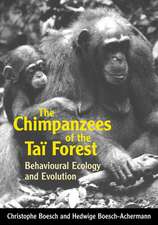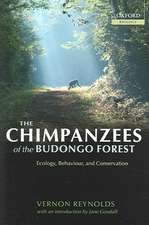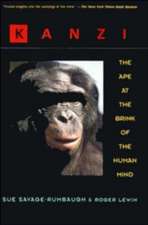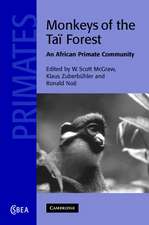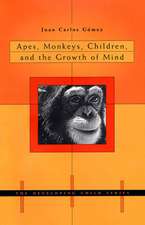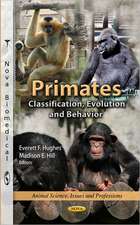Primate and Human Evolution: Cambridge Studies in Biological and Evolutionary Anthropology
Autor Susan Cachelen Limba Engleză Paperback – 26 mai 2021
| Toate formatele și edițiile | Preț | Express |
|---|---|---|
| Paperback (1) | 396.29 lei 6-8 săpt. | |
| Cambridge University Press – 26 mai 2021 | 396.29 lei 6-8 săpt. | |
| Hardback (1) | 1143.04 lei 6-8 săpt. | |
| Cambridge University Press – 10 mai 2006 | 1143.04 lei 6-8 săpt. |
Din seria Cambridge Studies in Biological and Evolutionary Anthropology
-
 Preț: 479.80 lei
Preț: 479.80 lei -
 Preț: 390.84 lei
Preț: 390.84 lei - 14%
 Preț: 750.86 lei
Preț: 750.86 lei - 11%
 Preț: 700.59 lei
Preț: 700.59 lei - 14%
 Preț: 722.61 lei
Preț: 722.61 lei - 9%
 Preț: 846.79 lei
Preț: 846.79 lei - 11%
 Preț: 460.98 lei
Preț: 460.98 lei - 11%
 Preț: 566.50 lei
Preț: 566.50 lei -
 Preț: 367.91 lei
Preț: 367.91 lei - 11%
 Preț: 693.77 lei
Preț: 693.77 lei -
 Preț: 356.37 lei
Preț: 356.37 lei - 11%
 Preț: 633.61 lei
Preț: 633.61 lei - 11%
 Preț: 619.90 lei
Preț: 619.90 lei -
 Preț: 279.00 lei
Preț: 279.00 lei -
 Preț: 304.74 lei
Preț: 304.74 lei -
 Preț: 371.32 lei
Preț: 371.32 lei -
 Preț: 376.06 lei
Preț: 376.06 lei -
 Preț: 332.66 lei
Preț: 332.66 lei -
 Preț: 421.01 lei
Preț: 421.01 lei -
 Preț: 303.60 lei
Preț: 303.60 lei -
 Preț: 309.27 lei
Preț: 309.27 lei -
 Preț: 376.62 lei
Preț: 376.62 lei - 11%
 Preț: 424.92 lei
Preț: 424.92 lei -
 Preț: 308.50 lei
Preț: 308.50 lei -
 Preț: 317.11 lei
Preț: 317.11 lei -
 Preț: 453.33 lei
Preț: 453.33 lei -
 Preț: 322.41 lei
Preț: 322.41 lei -
 Preț: 433.83 lei
Preț: 433.83 lei -
 Preț: 435.78 lei
Preț: 435.78 lei -
 Preț: 471.93 lei
Preț: 471.93 lei - 11%
 Preț: 474.71 lei
Preț: 474.71 lei -
 Preț: 428.90 lei
Preț: 428.90 lei - 14%
 Preț: 934.70 lei
Preț: 934.70 lei
Preț: 396.29 lei
Nou
Puncte Express: 594
Preț estimativ în valută:
75.83€ • 79.38$ • 62.74£
75.83€ • 79.38$ • 62.74£
Carte tipărită la comandă
Livrare economică 05-19 aprilie
Preluare comenzi: 021 569.72.76
Specificații
ISBN-13: 9781108949439
ISBN-10: 1108949436
Pagini: 488
Dimensiuni: 152 x 227 x 26 mm
Greutate: 0.64 kg
Editura: Cambridge University Press
Colecția Cambridge University Press
Seria Cambridge Studies in Biological and Evolutionary Anthropology
Locul publicării:Cambridge, United Kingdom
ISBN-10: 1108949436
Pagini: 488
Dimensiuni: 152 x 227 x 26 mm
Greutate: 0.64 kg
Editura: Cambridge University Press
Colecția Cambridge University Press
Seria Cambridge Studies in Biological and Evolutionary Anthropology
Locul publicării:Cambridge, United Kingdom
Cuprins
Preface; 1. Introduction; 2. A brief history of primatology and human evolution; 3. The catarrhine fossil record; 4. Primate speciation and exstinction; 5. Anatomical primatology; 6. Captive studies of non-human primates; 7. What can non-human primate anatomy, physiology, and development reveal about human evolution?; 8. Natural history intelligence and human evolution; 9. Why be social? - the advantages and disadvantages of social life; 10. Evolution and behaviour; 11. The implications of body size for evolutionary ecology; 12. The nature of the fossil record; 13. The bipedal breakthrough; 14. The hominid radiation; 15. Modelling human evolution; 16. Archaeological evidence and models of human evolution; 17. What does evolutionary anthropology reveal about human evolution?; 18. Final thoughts on primate and human evolution.
Recenzii
'The range and breadth of topics covered in this lengthy book are undeniably impressive, and Cachel certainly dares to be different. There are forays into artificial intelligence, speciation, primates as models (and non-models), neuroanatomy, the origins of sociality, the evolutionary implications of body size, the possible impact of diet on sexual dimorphism, taphonomy, bipedalism, Hox genes, tool use, technology, … the list goes on. And all interspersed with condensed histories of primatology and palaeoanthropology. … wide-ranging and thought-provoking …' PaleoAnthropology
'Primate and Human Evolution contains great food for thought, but great thought is only the first and easiest step toward great science. As many of our eager undergraduate majors enter anthropology as unintentional chimpocentrics because of their exposure to primatology in media and popular culture, Primate and Human Evolution will help students take that first step.' International Journal of Primatology
' … a provocative, refreshingly nonconfrontational, structured set of musings on hominin evolution …' American Journal of Physical Anthropology
'Primate and Human Evolution contains great food for thought, but great thought is only the first and easiest step toward great science. As many of our eager undergraduate majors enter anthropology as unintentional chimpocentrics because of their exposure to primatology in media and popular culture, Primate and Human Evolution will help students take that first step.' International Journal of Primatology
' … a provocative, refreshingly nonconfrontational, structured set of musings on hominin evolution …' American Journal of Physical Anthropology
Notă biografică
Descriere
This book provides a synthesis of evolutionary anthropology integrating primate research with that from the earliest human records.

